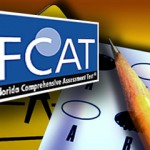How Does Arne Duncan Feel About Florida’s New School Ranking System?

Laura Figueroa / Miami Herald
U.S. Secretary of Education Arne Duncan visits Pembroke Pines Charter High School in Broward County with Mayor Frank Ortis.
Last month, Gov. Rick Scott told the Florida Department of Education to rank all of Florida’s 3,078 schools from best to worst.
That list was released last week — to criticism that it relied mostly on FCAT scores and did not take poverty into account.
So, my colleague John O’Connor and I wondered how U.S. Secretary of Education Arne Duncan felt about the rankings. He made a stop in South Florida last week to talk about boosting college completion rates and making college more affordable.
During a town-hall style meeting at Pembroke Pines Charter High School in Broward County, Duncan told the crowd of high school seniors and their parents something that stuck with us.
Duncan said, “The problem with No Child Left Behind is that it measured [student] success by not being called a failure.”
Duncan also talked about the stigma of being called a failure. So I asked Duncan what he thought of Florida’s new school ranking system that labels schools first to last. I thought he’d feel the same about the rankings as he does about NCLB. But Duncan told StateImpact Florida he thinks “it’s very important that we tell the truth in education,” and measure success and failure.
“We’ve stayed in the sideline for far too long… We have dropout rates of 40, 50, 60%. I think we need to challenge that with everything we can.”
-U.S. Secretary of Education Arne Duncan
“So if you see a school that’s improving and we’re rewarding that, I think that’s really important. If you see a school that is flat-lining or getting worse, I think we have to challenge the status quo,” he said.
Duncan said poor Florida schools can learn from the high achieving schools, and that identifying the best schools can help the state share best practices.
“We’ve stayed in the sideline for far too long,” he said. “Where we have folks that are just not working with a sense of urgency and we have dropout rates of 40, 50, 60% … I think we need to challenge that with everything we can.”
The elementary and middle school rankings are based solely on scores from the state’s standardized exam, the FCAT.
Duncan said that test alone may not be a fair way to measure growth and gains. Just like graduation rates alone wouldn’t be the best way either, he said.
“You [have] to look at multiple measures… Looking at yes, results, but also graduation rates, looking at college-going rates, looking at college-perseverance rates, looking at students passing [Advanced Placement] classes. There’s a whole set of things you can look at and… get a more comprehensive view of success and progress.”
Some high school rankings do consider graduation rates, accelerated coursework and college or career readiness. But 37 high schools were ranked solely on the FCAT this year.
And for schools like Noah’s Ark International Charter School in Riviera Beach, which came in last place among elementary schools at 1,795th place, or Broward Community Charter School, which ranked last among middle schools at 583rd place, Duncan has some encouraging words for them.
“For me it’s not about where you are today. It’s about where you are tomorrow.”
Duncan said that if a last place school improves next year, that school should be rewarded for improving and encouraged to keep improving. And if first-place West Melbourne Elementary School for Science in Brevard County starts getting complacent, the state should recognize that and step in, he said.

